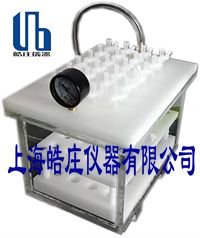soundproof pod,soundproof office pod,office phone booth,privacy pod,meeting pod,workplace pod Suzhou Uplift Intelligent Technology Co., Ltd , https://www.upliftec.com Shanghai Xinzhuang Instrument Co., Ltd. is committed to a business philosophy centered on technological innovation, continuously contributing to the advancement of society through strategic and product innovations. As an integrated company that combines R&D, manufacturing, and sales, it prides itself on delivering high-quality products and exceptional service. Specializing in laboratory equipment, the company has built a strong reputation for its reliability and performance in various scientific fields.
Solid-phase extraction (SPE) has become one of the most widely used techniques in chemical separation and purification over the past two decades. It plays a crucial role in sample preparation, from trace analysis to large-scale industrial applications. This technique is extensively applied in pharmaceuticals, fine chemicals, biomedical research, food analysis, organic synthesis, environmental monitoring, and many other areas.
At its core, SPE is a physical process involving interaction between a liquid phase and a solid phase. The solid adsorbent used in this process has a stronger affinity for the target compound than the solvent in which the sample is dissolved. As the sample solution flows through the adsorbent bed, the desired compound is retained on the surface while other components pass through. This allows for the concentration and purification of the target analyte, making it easier to analyze or isolate.
The process typically involves two key steps: retention and elution. In retention, the analyte binds to the adsorbent due to the interaction between the compound, the solvent, and the adsorbent material. This binding can vary depending on the type of solvent and the nature of the adsorbent. Elution, on the other hand, refers to the removal of the retained compound by introducing a solvent that has a higher affinity for the analyte than the adsorbent. This step allows for the selective recovery of the target substance.
Adsorbent capacity and selectivity are critical factors in the success of SPE. The capacity refers to the maximum amount of analyte that can be retained by a given mass of adsorbent under optimal conditions. Different types of adsorbents, such as bonded silica, have varying capacities. Selectivity, meanwhile, is the ability of the adsorbent to distinguish between the target compound and other substances in the sample matrix. A highly selective adsorbent ensures that only the desired compound is retained, leading to better purity and efficiency in the extraction process.
Shanghai Xinzhuang Instrument Co., Ltd. continues to innovate and improve its range of laboratory instruments, ensuring they meet the evolving needs of researchers and scientists around the world. We welcome your inquiries and look forward to supporting your analytical work with reliable and advanced solutions. For more information, visit our website.
Shanghai Xinzhuang Instrument Co., Ltd. is committed to a business philosophy centered on technological innovation, continuously contributing to the advancement of society through strategic and product innovations. As an integrated company that combines R&D, manufacturing, and sales, it prides itself on delivering high-quality products and exceptional service. Specializing in laboratory equipment, the company has built a strong reputation for its reliability and performance in various scientific fields.
Solid-phase extraction (SPE) has become one of the most widely used techniques in chemical separation and purification over the past two decades. It plays a crucial role in sample preparation, from trace analysis to large-scale industrial applications. This technique is extensively applied in pharmaceuticals, fine chemicals, biomedical research, food analysis, organic synthesis, environmental monitoring, and many other areas.
At its core, SPE is a physical process involving interaction between a liquid phase and a solid phase. The solid adsorbent used in this process has a stronger affinity for the target compound than the solvent in which the sample is dissolved. As the sample solution flows through the adsorbent bed, the desired compound is retained on the surface while other components pass through. This allows for the concentration and purification of the target analyte, making it easier to analyze or isolate.
The process typically involves two key steps: retention and elution. In retention, the analyte binds to the adsorbent due to the interaction between the compound, the solvent, and the adsorbent material. This binding can vary depending on the type of solvent and the nature of the adsorbent. Elution, on the other hand, refers to the removal of the retained compound by introducing a solvent that has a higher affinity for the analyte than the adsorbent. This step allows for the selective recovery of the target substance.
Adsorbent capacity and selectivity are critical factors in the success of SPE. The capacity refers to the maximum amount of analyte that can be retained by a given mass of adsorbent under optimal conditions. Different types of adsorbents, such as bonded silica, have varying capacities. Selectivity, meanwhile, is the ability of the adsorbent to distinguish between the target compound and other substances in the sample matrix. A highly selective adsorbent ensures that only the desired compound is retained, leading to better purity and efficiency in the extraction process.
Shanghai Xinzhuang Instrument Co., Ltd. continues to innovate and improve its range of laboratory instruments, ensuring they meet the evolving needs of researchers and scientists around the world. We welcome your inquiries and look forward to supporting your analytical work with reliable and advanced solutions. For more information, visit our website.
Application principle of solid phase extraction technology